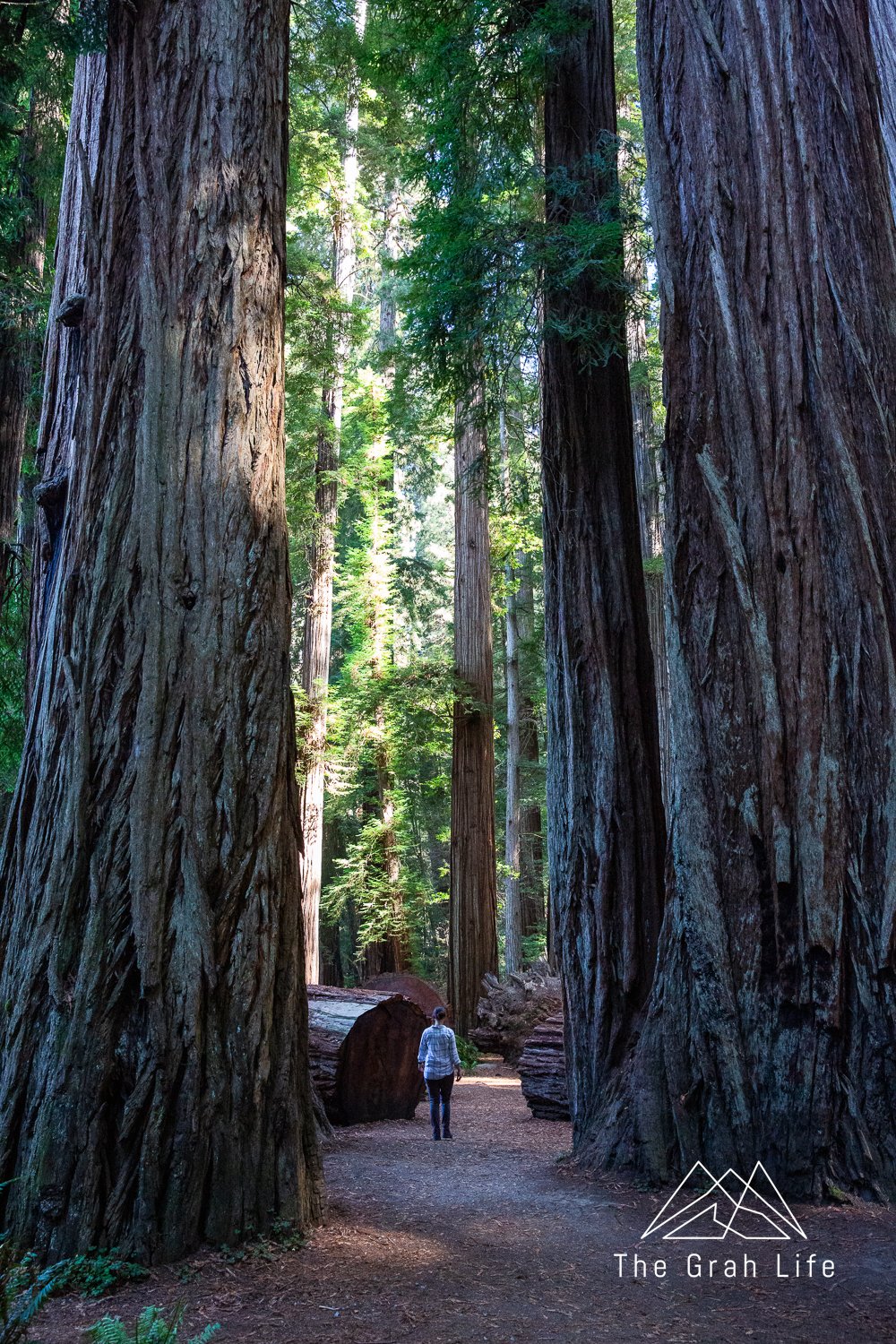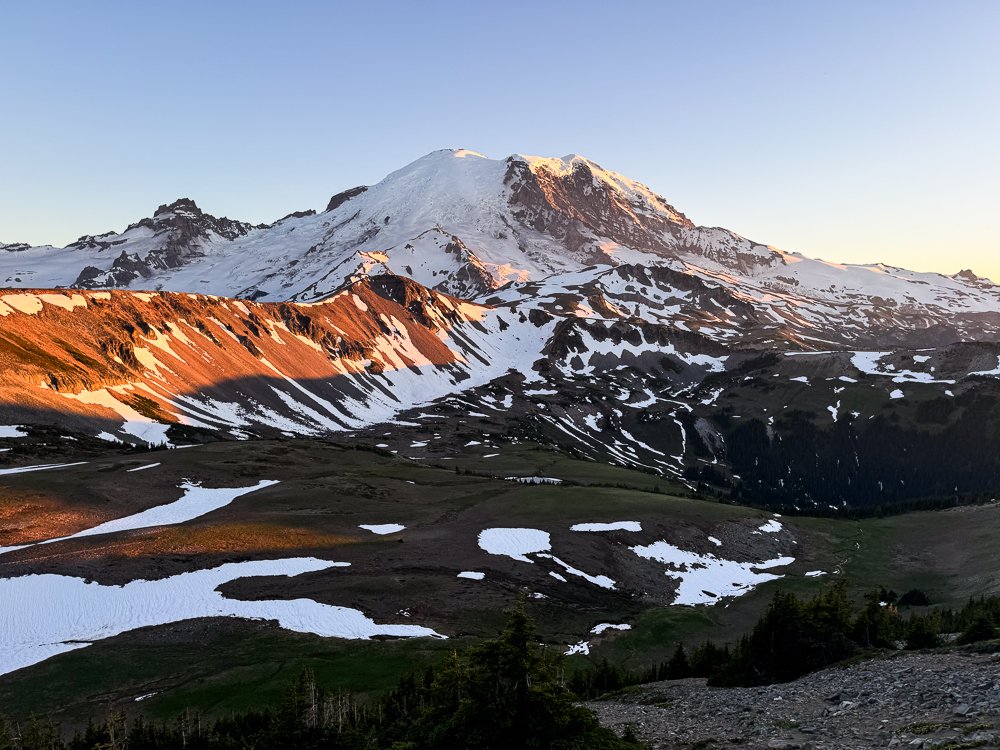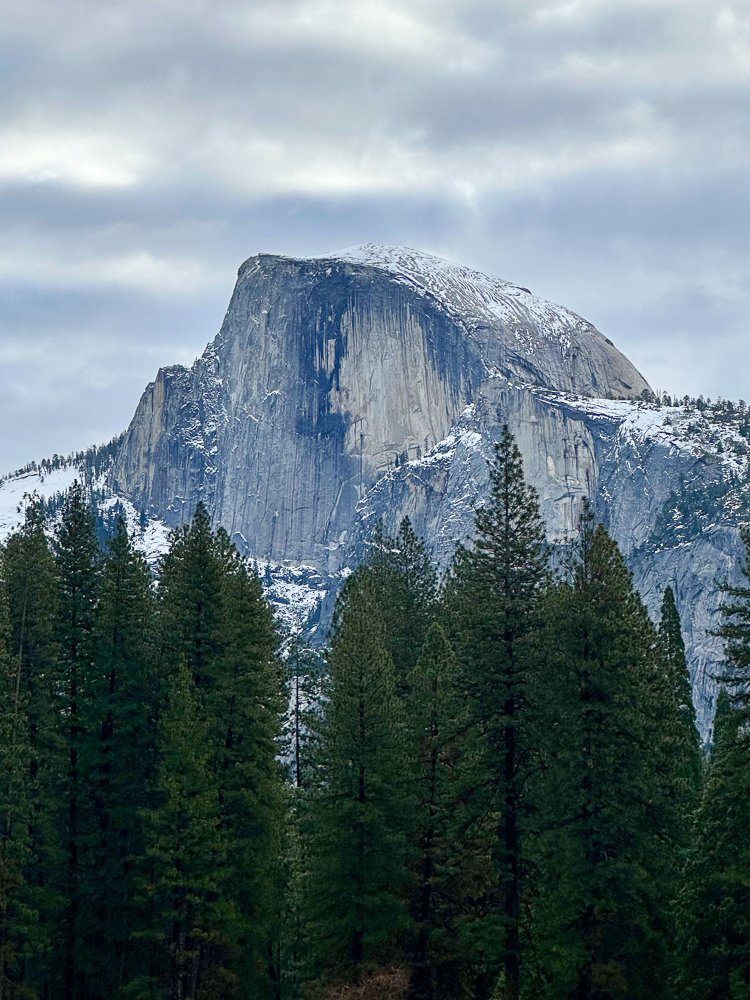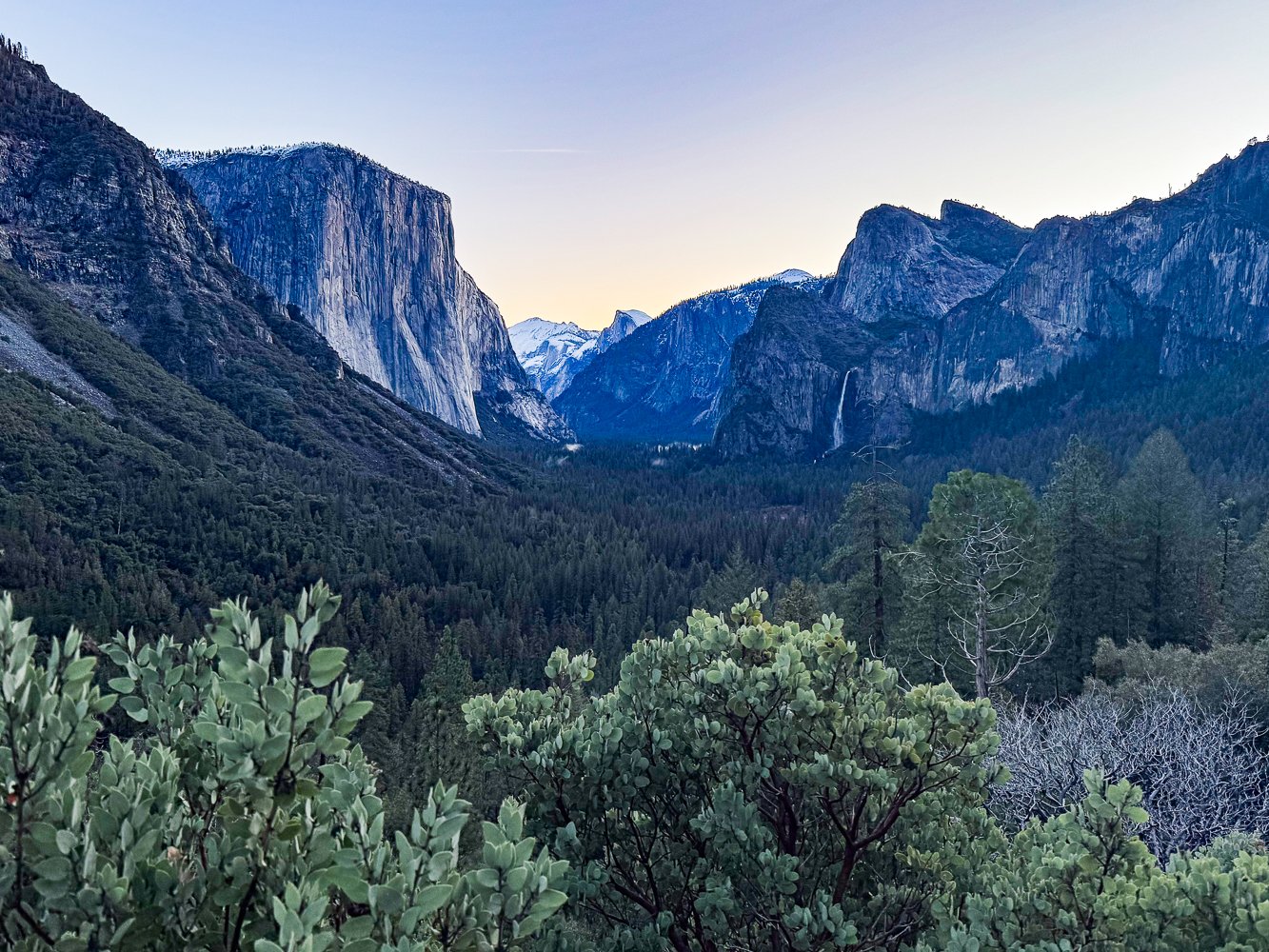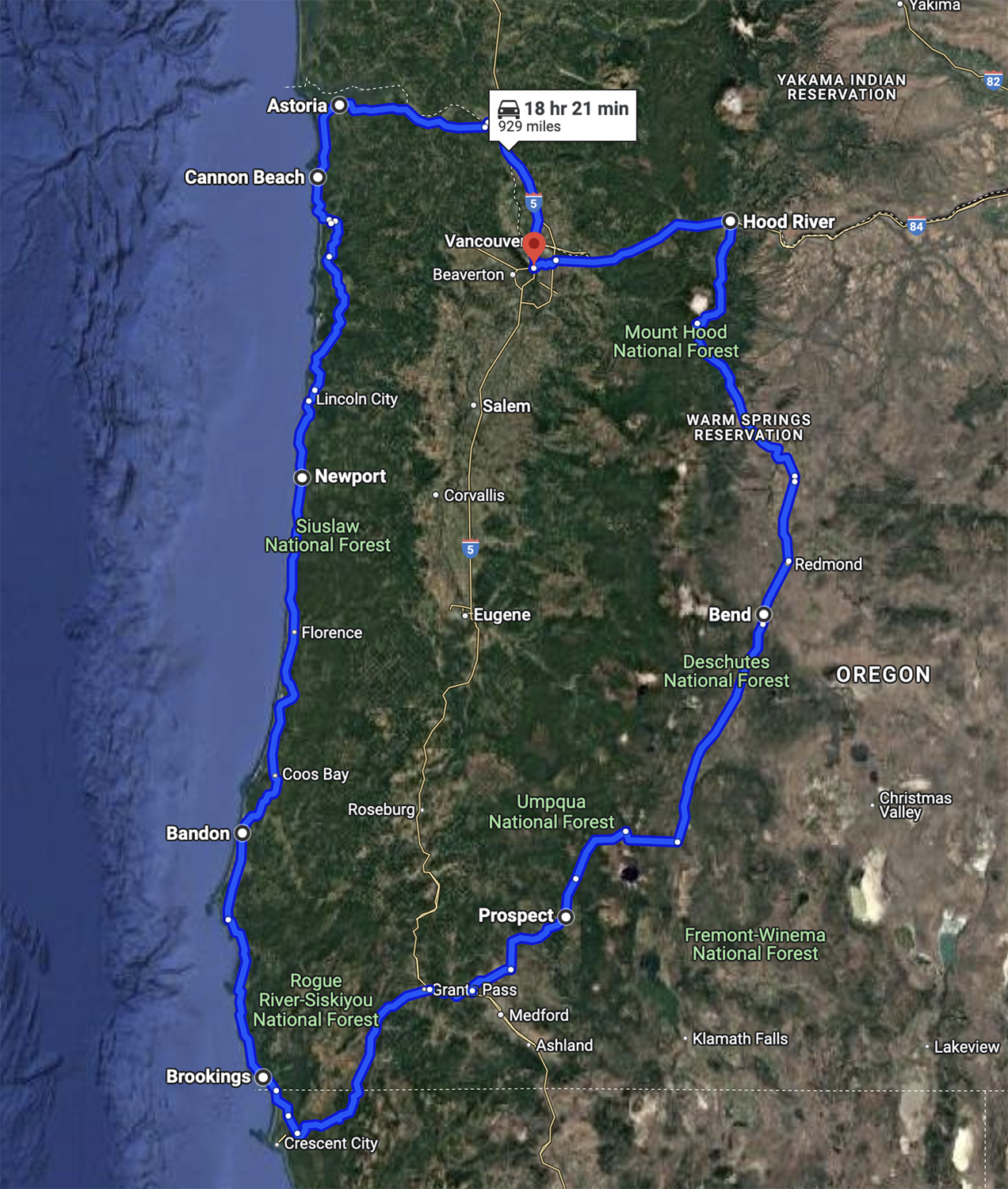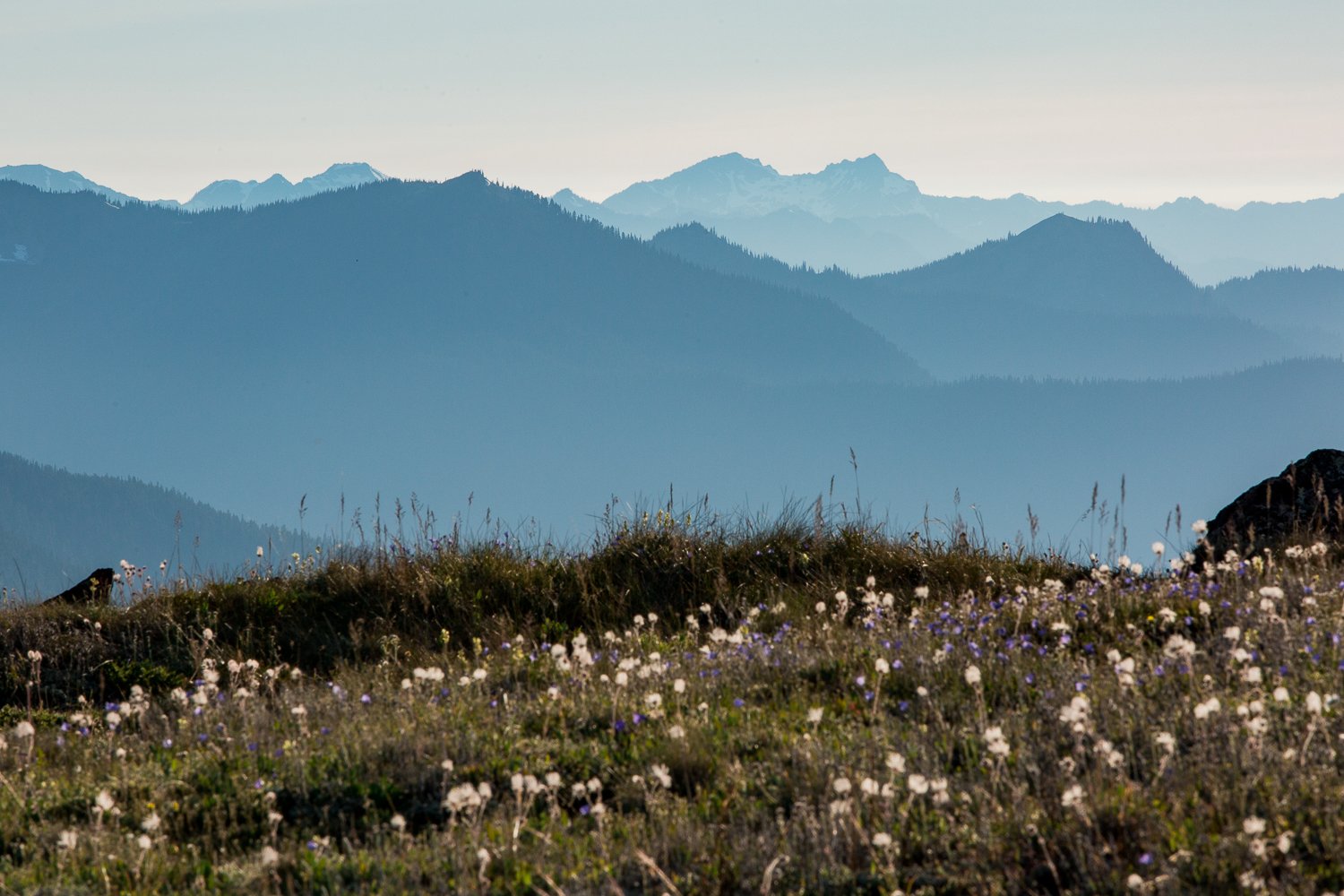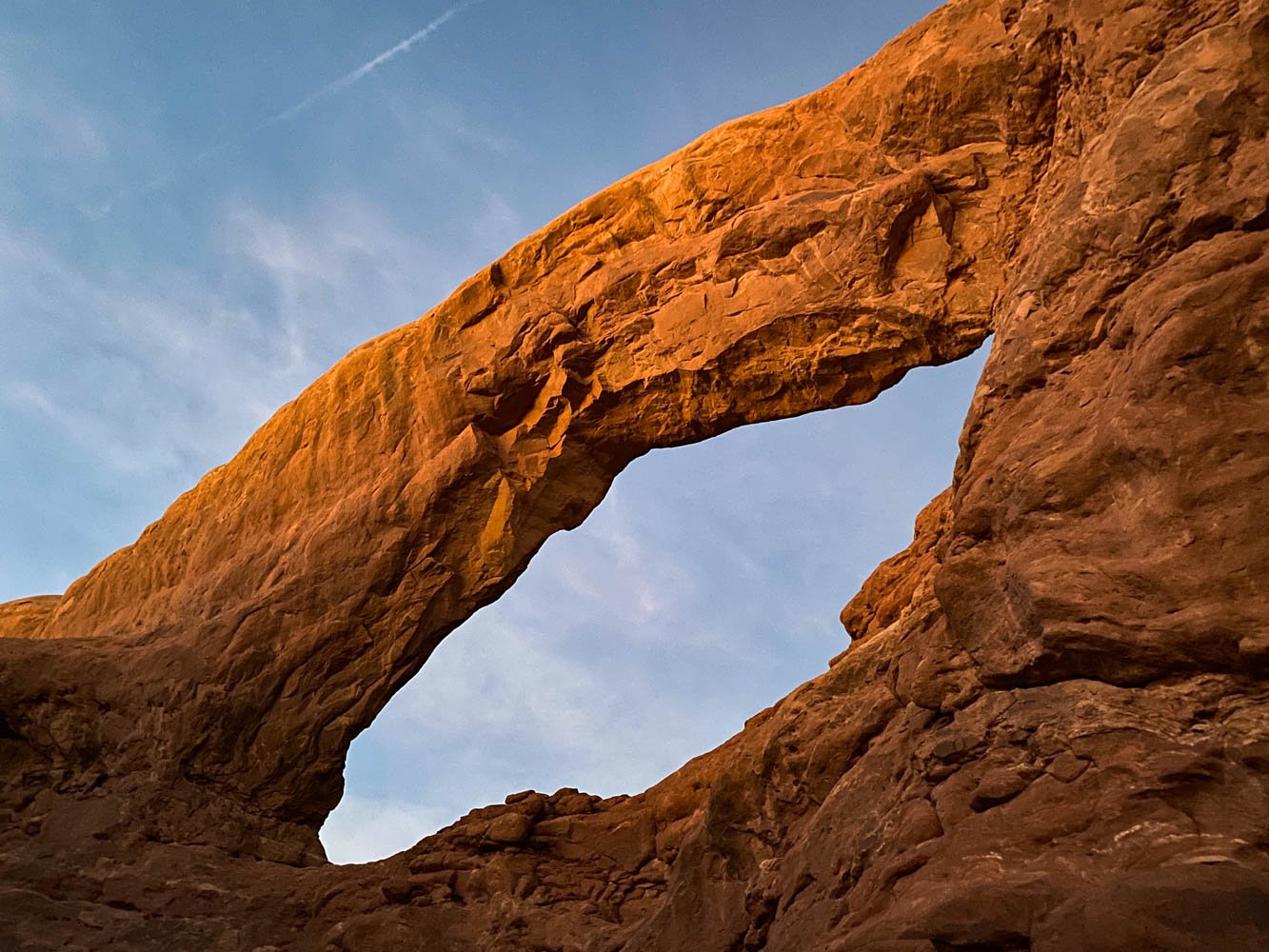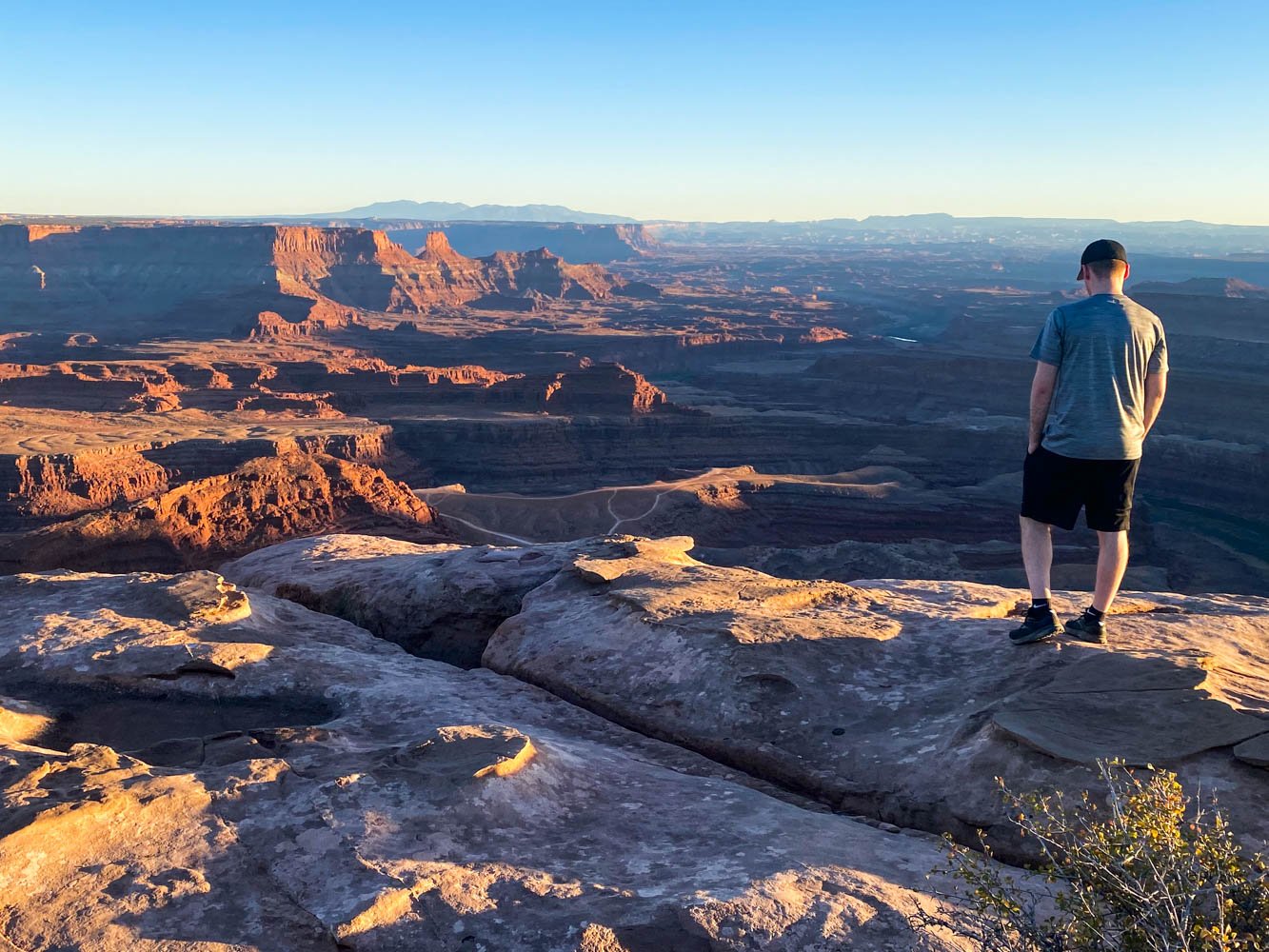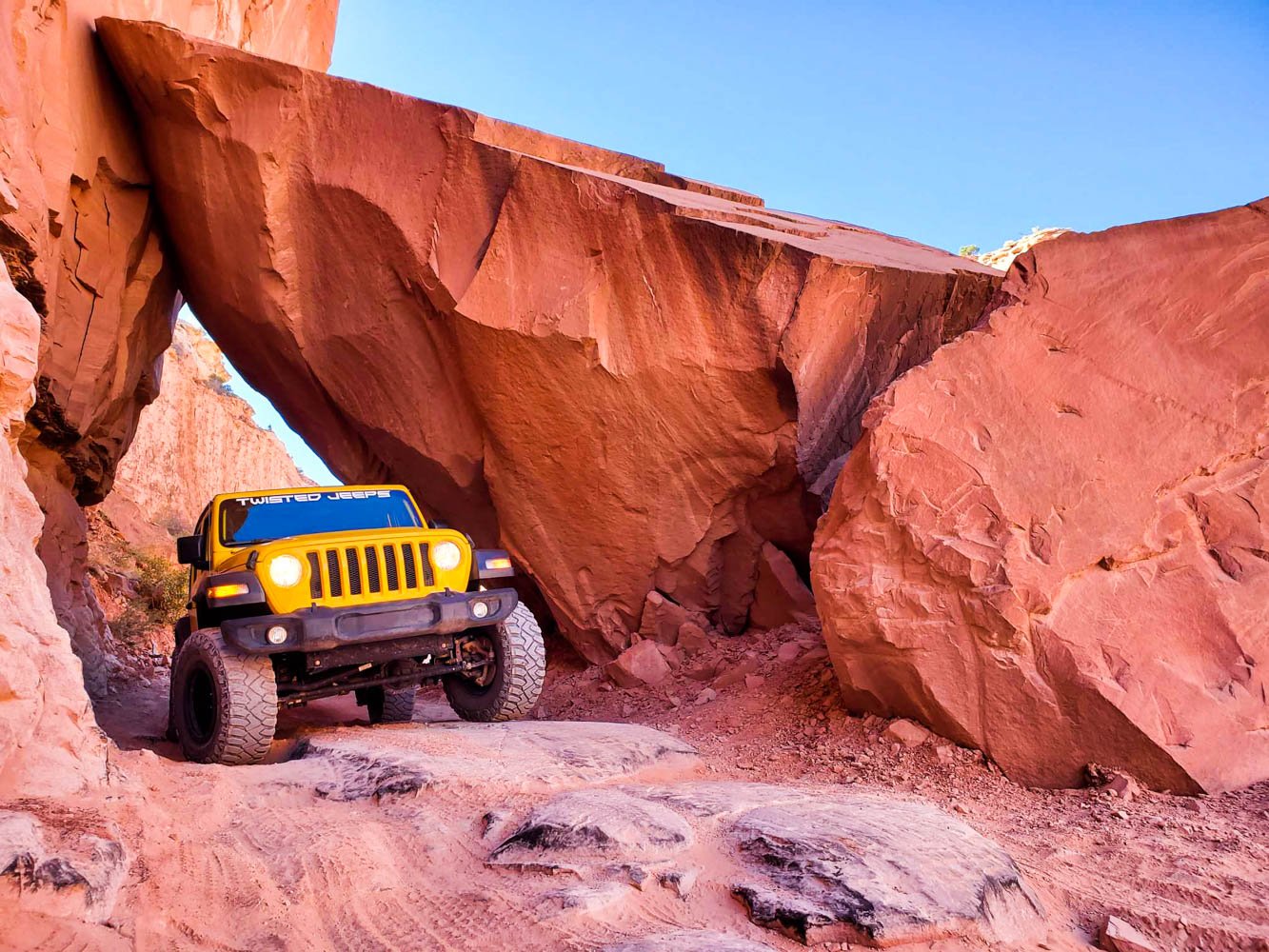Redwood National Park 1 to 4 Day Itinerary
The Redwood National Park is home to the tallest trees in the world! They date back to prehistoric times, and visiting is such an awe-inspiring experience. Along with seeing trees up to 2,400 years old, you’ll also enjoy 37 miles of wild coastline, rivers, prairies, and wildlife on 139,000 acres.
Park details
The Redwood National Park is comprised of four sections — one national park, one county park, and two California state parks. They all have large trees, and are all, of course, worth visiting. More on each below.
Jedediah Smith Redwood State Park
The Jedediah Smith Redwood State Park has more old-growth trees per acre than any other park. We love that it has 30 miles of hiking trails, a scenic drive, a navigable river, and is close to the beach. You might recognize it because Star Wars: Return of the Jedi was filmed here. Of all the Redwood parks, this one is the smallest, at 10,000 acres. It’s small, but mighty!
Del Norte Redwoods State Park
With 33,000 acres, the Dell Norte Redwoods State Park has eight miles of wild coastline, 33 miles of hiking trails, scenic drives, and 50% of its forests are old growth.
Prairie Creek Redwoods State Park
Home to the tallest redwood trees, Prairie Creek Redwoods State Park has 354 redwood groves, 17 miles of hiking trails, and a 19-mile bike loop. The park is 14,000 acres and is known for wildlife watching.
Humboldt Redwoods State Park
With 53,000 acres, the Humboldt Redwoods State Park is the largest contiguous forest of old-growth redwoods. It has 163 redwood groves, over 100 miles of hiking trails, the famous Avenue of Giants roadway, and the beautiful Eel River.
Getting to the Redwoods
The Medford Airport (MFR) is the closest international airport to the Redwoods — just a two-hour drive from the Jedediah Smith Redwoods State Park. The airport is smaller, so direct flights may be hard for some to find.
If you’d rather fly into a larger airport, fly into San Francisco International Airport (SFO) and drive four hours north to reach the Humboldt Redwoods State Park.
Wherever you fly in, you will need your own car to get around and thoroughly explore the Redwoods.
Park entrance fees
Unlike most national parks in the U.S., the Redwood National and State Parks are free to visit. They do not require park passes.
When to visit
Although the Redwoods are accessible year-round, spring and fall are the best times to visit. Summer brings crowds, while winter brings up to 12 inches of rain in some areas. Spring and fall have moderate temperatures, lower chances of rain, and fewer visitors.
April to early June
Most lush
Visit in spring to see the forest at its greenest, lushest state. Visit before Memorial Day for fewer crowds.
September to October
Fewest crowds
Whenever we visit the Redwoods in the fall, we’re always shocked to have great weather and trails to ourselves. In the fall it tends to rain at night, and the daytime temperatures are generally warm and clear. Visit between mid-October and mid-November for fall colors and lower fire danger (meaning less smoke from wildfires!).
Where to stay
The Redwood parks are spread out just enough that we recommend booking lodging near each section of the park you’ll be visiting. There are lodging recommendations throughout our itinerary, but you’ll find an extensive list covering each area, for every budget, here.
Is the Redwood National Park pet-friendly?
Pets are not allowed on any trails in the Redwood National Park. However, they are allowed in the places listed here. Service animals are the exception to these rules, and they can accompany their owner to all park locations.
Wherever you plan on taking your pets, you’ll need to follow B.A.R.K. rules.
B: Bag your poop
A: Always wear a leash
R: Respect Wildlife
K: Know where to go
Best hikes
The Redwood National Park system has over 200 miles of trails. There are so many great options that we have another blog detailing the best hikes in each area here.
Best activities in the Redwood National Park
Scenic drives
Each section of the Redwood National Park has a scenic drive worth traveling. It’s a fantastic way to check out large sections of the park at a faster pace.
Check out this interactive map for drives throughout the park. We’ve included the best drives in our itinerary as well.
Kayaking
Known as the “Redwood float”, kayaking down the Smith River in Jedediah Smith Redwoods State Park is a local gem. It’s one of the clearest rivers in the U.S., with emerald-colored water, and it’s such a mellow ride that almost anyone can enjoy it.
You can reserve a guided kayak tour with rangers here or book a trip with Redwood Rides.
Kayaking down the Smith River is how one of Meghann’s elopement couples celebrated getting married!
Biking
There are biking trails throughout the park, but most of the biking trails are in the southern sections of the Redwoods parks.
You can also bike the Newton Drury Parkway on the first Saturday of the month between October and May when they close the road for “hike and bike day”.
Wildlife watching
You’ll have the opportunity to see a variety of wildlife upon visiting the Redwood National Park. Birding is especially great because approximately one-third of the United States bird species live in the redwoods! Look for Roosevelt elk in the meadows, but give them at least 25 yards of space, and even more during spring and fall.
Check out tide pools on beaches and look for sea lions that live on the coast year-round. You’ll find a colony living close to shore at South Beach in Crescent City. Gray whales migrate north in May, with Killer Whales passing by in September (check out this blog for tips on seeing them). It’s also possible to see harbor porpoises on calm days any time of year.
Redwoods itinerary
We’ve created this itinerary so it’s possible to visit all four sections of the Redwoods in one trip, or you can choose to visit one section at a time. We’ve organized it from North to South, but you could do it backward just as well.
Itinerary breakdown
Day 1: Jedediah Smith Redwoods State Park
Day 2: Del Norte Redwoods State Park
Day 3: Prairie Creek Redwoods State Park
Day 4: Humboldt Redwoods State Park
Day 1: Jedediah Smith Redwoods State Park
Mileage: 130
Drive time: 3 hours 15 minutes
Start: Medford
End: Crescent City
Arriving in Crescent City
If you’re flying into Medford, rent a car and stop to see the Oregon Caves National Monument and Preserve. They’re open between Memorial Day and Labor Day, and it’s best to reserve tickets in advance.
When you get to Crescent City, stop at the Chart Room Restaurant for lunch on the pier to hear sea lions barking across the water.
Jedediah Smith Redwoods
Head to the Simpson-Reed Trail first. It’s a quieter, beautiful grove, with about a mile of trails to wander. It makes for a great first impression!
Hiouchi Visitor Center
Stop here for park swag and information.
Howland Hill Road
Make your way to the Howland Hill Road next. You’ll see great redwood trees along the drive, but if you have the time, stop for a few hikes along the route. Please note that the road is narrow, and conditions vary throughout the year.
The first hike you’ll run into is the Stout Memorial Trail. It’s less than a mile long, but popular and worth a visit because you’ll get to walk through a portion of the trail with the most incredible downed redwood trees.
We highly recommend hiking the 1.7-mile Grove of Titans trail as well. It’s known for having the most unique trees in the Redwoods park system! If that’s not enough exploring for you, stop at the Boy Scout Tree Trail next. It’s a 5.2-mile out-and-back hike, but the most impressive redwoods are near the start of the hike.
Day 2: Del Norte Redwoods State Park
Mileage: 20
Drive time: 40 minutes
Start: Crescent City
End: Crescent City
If you have the time, spend another day in Crescent City. If your schedule is tighter, move on to day three of this itinerary.
Tide pool
We love tide pooling! You’ll want to check out our blog all about tide pooling before heading to Enderts Beach. It is a 1.3-mile (round trip) hike and has some of California’s best tide pools. Time your visit with low tide, and beware of the tide trap at the southern end of this beach. A great viewpoint overlooks the coast near the parking lot, so it’s a worthwhile adventure even if you’re not up for the hike.
Spend time on the river
Consider relaxing on the Smith River as well. Check out the Jedediah Smith Campground Day Use area for easy river access. If you’re visiting during the summer, head to the south of the campground to find a seasonal bridge connecting the campground to the Simpson-Reed Trail.
For a more adventurous day, take a guided kayaking tour. Check out guided kayaking options with rangers here or book a tour with Redwood Rides.
Hike
If you’re looking for another hike, check out the Damnation Creek Trail. It’s four miles long, has great redwoods at the start of the trail, and has a view of the ocean at the end of the trail.
Day 3: Prairie Creek Redwoods State Park
Mileage: 85
Drive time: 2 hours
Start: Crescent City
End: Trinidad
You’ll have your choice of tourist attractions, wildlife viewing, and amazing hikes in the Prairie Creek Redwoods State Park.
Along the way
Trees of Mystery
You’ll come across the Trees of Mystery as you drive south to Prairie Creek. You’ll find the infamous statue of Paul Bunyan here, a large gift shop, and you can pay to go on a canopy walk and gondola ride through redwood trees.
This is not part of the national park system, but is a unique way to experience the forest. It felt a bit too much like a tourist trap to us, so we opted to skip this attraction.
Klamath Tour Thru Tree
This is the first of three trees you can drive through. The other two are closer to the Humboldt Redwoods State Park. Bring $5 in cash to leave as a donation — it’s a quick but cheap and fun stop.
High Bluff Overlook
This beautiful overlook is just ten minutes out of the way. Stop here for great views of the Pacific, and if you’re up for a scenic drive, take the Coastal Drive to connect with the Newton B. Drury Scenic Parkway. Please note that this drive isn’t suitable for RVs or vehicles towing trailers.
Newton B. Drury Scenic Parkway
You won’t see as many great redwood trees from this road since it has dense foliage that blocks the views into the woods. However, there are lots of pullouts and amazing trails along the way.
Note: this road closes the on the first Saturday of each month between October and May for “hike and bike day,” as well as during stormy weather or if it’s below freezing.
Fern Canyon
If you can snag a reservation (required between mid-May and mid-September), this should be your first stop along the Newton B. Drury Scenic Parkway. The 50-foot canyon full of ferns is so incredible that it was used in the film The Lost World: Jurassic Park. Expect to wade through water if you’re visiting between late fall and early spring.
If you missed out on reservations, you can still see the canyon by hiking the 11.5 mile Miner’s Ridge and James Irvine Loop starting at the Gold Bluffs Beach Campground. The road there is rough though!
Corkscrew Tree
Find a pullout near the start of the Corkscrew Tree Trail. From the road, it’s a quick walk to check out this twisty tree.
Big Tree Loop
This tree isn’t far off the paved trail from the parking area. For a short walk, do the Big Tree via Circle Trail, or the Big Tree Loop if you’re up for a three-mile hike.
Maddison Grant Forest and Elk Refuge
This area is a large meadow on the southern end of the parkway. If you’re lucky, you’ll see Roosevelt elk here. Just be sure to stay at least 25 yards away from them.
Sue-Meg State Park
As you drive south to Trinidad, you’ll pass by the Sue-Meg State Park. It’s one square mile, but there is much to see here. You’ll find a reconstructed Yurok village and native plant garden on the interior, as well as tide pools, seals, sea lions, and migrating whales on the exterior.
Trinidad
Stay at the Trinidad Baby Bed and Breakfast and grab dinner at the Trinidad Bay Eatery to end your day.
Day 4: Humboldt Redwoods State Park
Mileage: 93 miles
Drive time: 4 hours
Start: Trinidad
End: Benbow
Trinidad
The Beachcomber Café in Trinidad is a fantastic way to start your day. Afterward, the Trinidad Head Lighthouse is worth a quick stop if you’re visiting on the first Saturday of the month when the lighthouse is open for viewing. From the parking area, it’s a half-mile walk uphill to the lighthouse.
Eureka
Drive south to the Victorian town of Eureka. Stop by the Café Waterfront for a meal, and drive by the Carson Mansion and Pinc Lady Mansion to see the most impressive Victorian houses.
Avenue of Giants
From Eureka, the Humboldt Redwoods State Park is a 35-minute drive. Just after you pass the town of Stafford, you’ll get off the highway to drive the Avenue of Giants, here. It’s known as the finest forest drive in the world!
We recommend packing a picnic lunch for the drive, but there are a few restaurants along the route. The entire drive takes about two and a half hours without stopping, but you should plan to spend at least half your day here.
Stop anywhere you please along the Avenue of Giants, but make it a point to stretch your legs at the Grieg-French Bell Grove and the Immortal Tree along the way.
To hike a few more shorter trails (less than 0.6 miles each) take the Mattole Road to stop at the Big Trees Day Use Area, Rockefeller Loop, and the Founders Grove Nature Loop.
From there, continue driving the rest of the Avenue of Giants Road. You’ll pass by the Shrine Thru Tree, the only drive-thru tree that was primarily created by nature, not man. You’ll also pass by the Humboldt Redwoods State Park Visitor Center, great river access from the Williams Grove Day Use Area, and the impressive Stephens Grove Trail before reaching the end of the Avenue of Giants here.
Lodging
Where you choose to stay will depend on where you’re headed next. On to San Francisco? Head to Bendbow and stay at the Historic Inn. Driving back north? Head to Scotia and stay in Scotia Lodge.
Leave no trace
It’s always important to follow the Leave No Trace Principles to ensure the Redwoods beauty stays for many years to come. Please pack out your trash, stay on trails, and do not walk on top of fallen trees — they are part of the ecosystem and are home to worms, spiders, amphibians, beetles, and crickets!
What to pack
The weather can feel very chilly in the mornings, so bring layers and be prepared for rain or shine. Check out our Pacific Northwest packing list with great layers and hiking gear, here.
Park tips
Cell service
Cell service goes in and out throughout the parks. Load your GPS directions in advance.
Traffic
If you do visit during the summer months, expect heavy traffic. Pack extra patience, well as extra water and snacks.
Damp weather
Humidity, fog, and rain can make the Redwoods feel colder than you’d expect. Bring warm layers, a raincoat, and waterproof shoes.
Where to go next
The Ultimate Oregon Road Trip
Check out this route and itinerary to see all of Oregon’s best sights! It includes the Oregon coast, Redwoods, Crater Lake, Bend, the Columbia River Gorge, and Portland.
Oregon Coast
Brookings, Oregon — known for having some of the Oregon’s coasts most stunning scenery — is just a half hour away from Crescent City. Extend your road trip with the potential to drive the entire Oregon coast.
Crater Lake
Crater Lake is four hours north of Crescent City, with Medford (the nearest airport) at the mid-way point. Visit to explore an entirely different landscape.
San Francisco
San Francisco is a four-hour drive from the Humboldt Redwoods State Park. There is a lot to see along the route, with even more sights to enjoy in the city!
Search the blog for more adventures! Try searching for topics such as “backpacking”, “waterfalls”, or “Arizona”.







